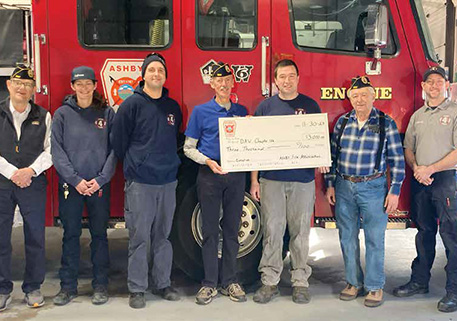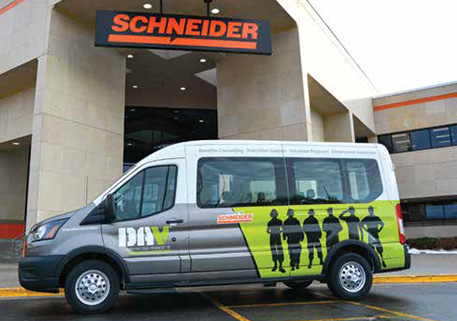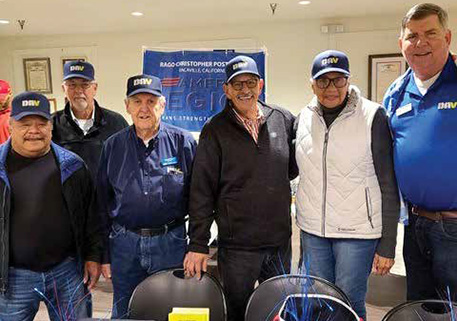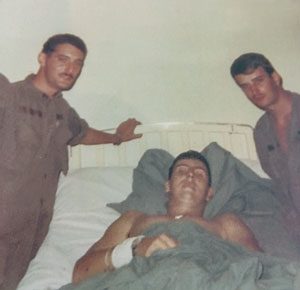
Family marks Vietnam veteran’s life after tragedy
D.J. Katsur had just turned 18 in the summer of 1969 when she got word her older brother had been critically wounded in Vietnam.
“My dad told me we’d received a telegram and that his wounds were severe,” said Katsur. “He told me to prepare myself for the second telegram.”
In doing so, her father prepared her for her sibling’s death.
While on patrol in Vietnam’s Mekong Delta—just 32 days after arriving in country—Katsur’s 20-year-old brother, Past National Commander Dennis Joyner, became a triple amputee as a result of a land mine explosion.
While he says he doesn’t remember the explosion itself or flying through the air, he does remember falling back down to the ground and realizing the extent of his injuries.
“That’s when I started to lose it; I was yelling, ‘Let me die! Let me die!’” said Joyner. “But my sergeant calmed me down by slapping me and reminding me of my family waiting for me back home. I came to the realization that I did have a lot to live for.”
When Joyner finally made it home to Pennsylvania, Katsur said, he was ready to get on with his life. His positive attitude and his determination inspired the rest of the family to follow suit.
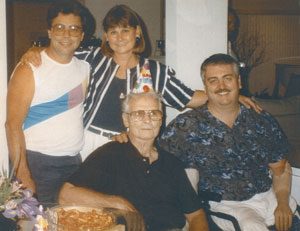

“Denny was a young man who came home from being wounded on the battlefield to going through rehab very quickly. He just started right in, living life,” said Katsur. “He was a husband, a father, a son, a brother; he was our example. He was awesome. My brother went off to war as my brother and he came back my brother.”
Over the years, Katsur started celebrating the anniversary of her brother’s injury by sending him a rose for each year. She said if he had been killed in action, she would be reflecting on his life and bringing flowers to the cemetery instead.
“It got to a point that I’d be sitting in my office at work and all of a sudden 38 roses would show up,” remembered Joyner, whom President Ronald Reagan named as the nation’s Handicapped American of the Year in 1983. “It was the 38th year of the ‘Alive Day.’ I know that was a great way to celebrate. Finally one year, I said, ‘This is wonderful, but you don’t have to do that. I’m here, and you’re here, and we’re happy.’”
And a happy and full life it has been for Joyner and his family. After his discharge from the Army, he earned an accounting degree and established a 30-year career in local government, first in his native Pennsylvania and later in Florida. While living in Pennsylvania, he was appointed by then-Governor Richard L. Thornburgh to serve on that state’s Vietnam Herbicide Commission.
In 2015, Joyner was appointed board president for the Disabled Veterans’ Life Memorial Foundation and is still currently serving in that position.
He and his wife, Donna, continue to raise awareness about what disabled veterans can do with the right support. Joyner also uses his story to counsel other injured or ill veterans who face a world of challenges after service. His accomplishments over the years have reinforced his sister’s celebrations for nearly a half-century.
“June 26 just became a day of thanking God and reflecting on this wonderful life that Denny was leading,” Katsur said. “Reflecting on what he does every day for his family, for his friends, for his community and for DAV. June 26 is still a day to reflect and to honor him. It’s our family’s Veterans Day. We recognize that day and always will. June 26 is just as important as his birthday.”
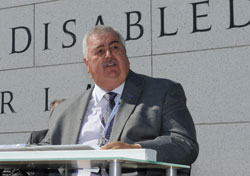

With the 50th anniversary of Joyner’s “Alive Day” approaching, he said remembering how difficult that time was for his family still affects him.
“I think of what my parents and my siblings and my friends went through,” he said. “That’s the hardest part of it all to me as I look back over 50 years.”
“Denny came back with such a positive focus-forward attitude,” said Katsur. “Denny made it easy for all of us. Here he was, wounded on the battlefield, sent to multiple hospitals, and he’s worried about his family. That’s who he is. He has strength. In his darkest hour, he was thinking about family.”
Still, he says he wouldn’t change a thing.
“I’d do it all over again. I don’t regret my time in the military; I don’t regret my time in Vietnam. I was there for my country, I have a deep faith in God, and I felt that whatever was going to be was going to be. I was just a small part of it,” Joyner said. “[My Alive Day] is a celebration of life. I know how fortunate I was. God had a different plan for my life; I was able to survive. It’s been a good life.”

